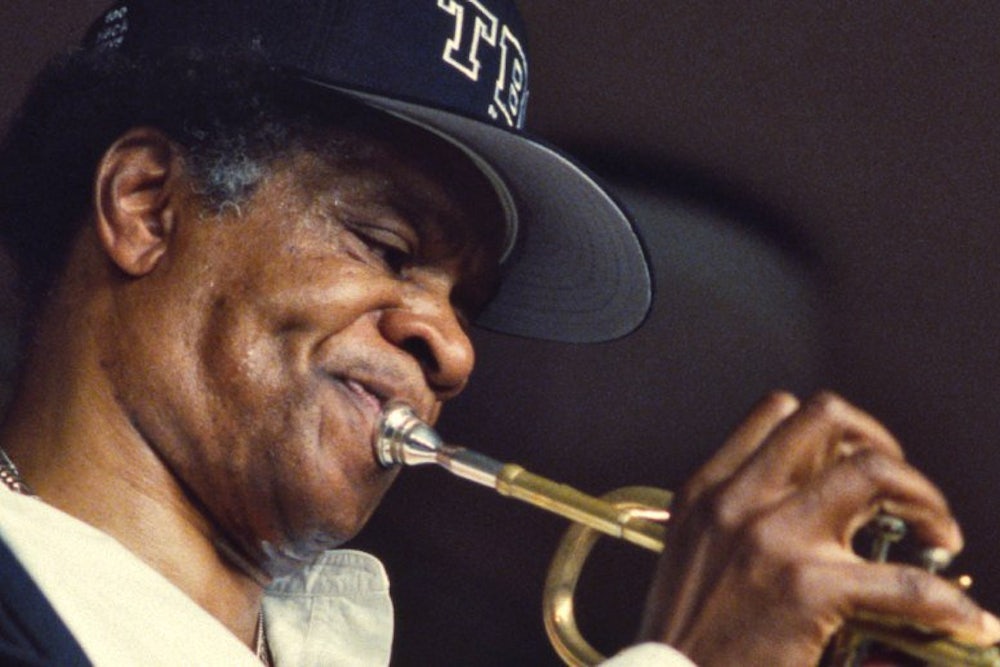The facts were sketchy, and that seemed utterly appropriate to Donald Byrd. Last week, a lesser-known jazz-oriented pianist named Alex Bugnon posted on his Facebook page an announcement that Byrd had died on February 4, at age 80. Referring to Byrd as his uncle, Bugnon wrote, “I have no more patience for this unnecessary shroud of secrecy placed over his death by certain members of his immediate family." A few publications, including the Guardian and Billboard, picked up Bugnon's announcement with the caveat that there has been no verification of the report from other sources. The New York Times did not write an official obituary until yesterday. All this uncertainty is appropriate, however, as Byrd's elusive contributions to American musical culture are essential and timely for the very fact of their elusiveness.
Byrd is the greatest American musician to become best known as a source of samples. What most listeners have heard of Byrd's work since the 1990s they have heard in snippets and layers of sounds: Dozens and dozens of hip-hop performers, from old-school innovators such as Public Enemy (who sampled Byrd's 1973 song "Flight Time" on their "Fear of a Black Planet" in 1990) and Naughty by Nature (who used parts of Byrd's 1962 "French Spice" on their "It's On" in 1993) to second-generation names like Ludacris (who put elements from Byrd's 1975 "Wind Parade" on his "Splash Waterfalls" in 2003) have sampled Byrd. Byrd released about 30 albums between 1959, when he made his debut as a jazz leader with the LP Off the Races, to 1981, when he left his send-off wet kiss, Love Byrd; but strains of his music have appeared as samples on more than a hundred hip-hop recordings.
Why did Byrd, among the thousands of jazz musicians who have sown sizable fields of harvestable sounds, become the go-to sample source for hip-hop artists? Part of the answer lies in the fact that Byrd largely abandoned orthodox jazz to make a hybrid form of jazz-pop-funk that foreshadowed the hybridization of music in the digital era. Having first earned attention in bebop circles as a sideman for such esteemed players such as Kenny Clarke, Jackie McLean, and Phil Woods, Byrd gave up the cerebralism and overt virtuosity of hard bop, though his improvisations would always be built with bop language, and his playing would never sacrifice intelligence for soul. (Byrd had both a law degree from Columbia and a Ph.D. from Teacher's College.) Byrd walked away from the doctrinal, almost legalistic formalism of the bop cult and strode coolly, unapologetically into the bell-bottomed, body-suited land of Afro funk. Jazz fundamentalists saw apostasy, and the larger public found music to groove by.
If the music on Byrd's funk albums was not jazz but any meaningful definition, its indisputable high quality as something other—something wise and sensuous, proudly black and just as proudly commercial, kinetic and smooth—made musical definitions seem meaningless and set pop music on its way toward the genre-collapsing of the twenty-first century. For hip-hop artists, starting in the ’90s, sampling Byrd was the most efficient possible way to establish one's work as savvily, jazzily cool.
In a sense, Byrd was already taking part in a kind of proto-sampling when he made his classic funk records of the 1970s. The source tracks for the majority of Byrd's most sampled recordings come from the series of albums Byrd made in the ’70s under the supervision of the production team of Larry and Fonce Mizell. The Mizell brothers were essential to the sound of four albums that Byrd released under his name as a leader and trumpeter: Black Byrd and Street Lady (both from 1972), Stepping Into Tomorrow (1973), and Places and Spaces (1974), as well an album by a group of Byrd's students at Howard University, The Blackbyrds (1973). The musicians were the Mizell brothers' house band (assembled around the core team of Harvey Mason on drums and Chuck Rainey on bass), and they played mostly music that the Mizells brought in for Byrd or composed themselves. As early as the 1970s, Byrd, as the trumpeter on his own albums, was essentially providing the Mizells with live samples of his own music. Groomed as a sideman, Byrd understood the value of contributing uniquely, individually, if not subordinately, to a complicated whole—at the considerable cost of having one's own identity subsumed by that whole. He was, as such, jazz's first twenty-first-century man.
